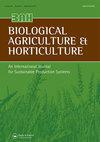Biological control of soilborne diseases in organic potato production using hypovirulent strains of Rhizoctonia solani
IF 1.6
4区 农林科学
Q3 AGRONOMY
引用次数: 11
Abstract
ABSTRACT Soilborne diseases are persistent problems in potato production and alternative management practices are needed, particularly in organic production, where control options are limited. Selected biocontrol organisms, including two naturally occurring hypovirulent strains of Rhizoctonia solani (Rhs1A1 and Bs69) and a commercially available Bacillus subtilis (GB03), were evaluated, both individually and in combination, for control of soilborne diseases of potato under organic production practices over three field seasons in Maine. Varying rainfall conditions over the 3 years significantly affected crop growth, tuber yield, and disease development. However, multiple biocontrol treatments resulted in significant reductions in black scurf and common scab under a variety of environmental conditions, reducing incidence and severity of each by 15–47%. Most biocontrol treatments reduced black scurf, but only specific treatments reduced common scab and silver scurf (by 15–40% and 16–24%, respectively). Combinations including both a hypovirulent strain and GB03 tended to be the most effective treatments overall. Although tuber yield varied greatly by year, Rhs1A1 and GB03 treatments, as well as combinations, increased yield by 11–37% over all three seasons. Use of hypovirulent R. solani, along with other biocontrol organisms, may provide reductions in soilborne diseases and enhanced yield in organic potato production.利用低毒力菌对有机马铃薯土传病害的生物防治
土传病害是马铃薯生产中持续存在的问题,需要替代管理实践,特别是在有机生产中,控制选择有限。在缅因州的三个田间季节中,对有机生产实践下马铃薯土媒疾病的防治效果进行了单独和联合评价,其中包括两种自然产生的索拉根丝核菌低毒菌株(Rhs1A1和Bs69)和一种市售枯草芽孢杆菌(GB03)。3年不同的降雨条件显著影响作物生长、块茎产量和病害发展。然而,在各种环境条件下,多种生物防治处理导致黑屑和普通痂的显著减少,发生率和严重程度分别降低了15-47%。大多数生物防治处理减少了黑屑,但只有特定处理减少了普通痂和银屑(分别为15-40%和16-24%)。总体而言,包括低毒性菌株和GB03的组合往往是最有效的治疗方法。虽然块茎产量的年际差异较大,但Rhs1A1和GB03处理和组合在三个季节的产量均提高了11-37%。在有机马铃薯生产中,使用低毒力的番茄红霉和其他生物防治生物可以减少土传疾病,提高产量。
本文章由计算机程序翻译,如有差异,请以英文原文为准。
求助全文
约1分钟内获得全文
求助全文
来源期刊
CiteScore
3.30
自引率
6.70%
发文量
18
审稿时长
>36 weeks
期刊介绍:
Biological Agriculture & Horticulture aims to act as the central focus for a wide range of studies into alternative systems of husbandry, and particularly the biological or organic approach to food production. The Journal publishes work of a sound scientific or economic nature related to any aspect of biological husbandry in agriculture, horticulture and forestry in both temperate and tropical conditions, including energy and water utilization, and environmental impact.

 求助内容:
求助内容: 应助结果提醒方式:
应助结果提醒方式:


